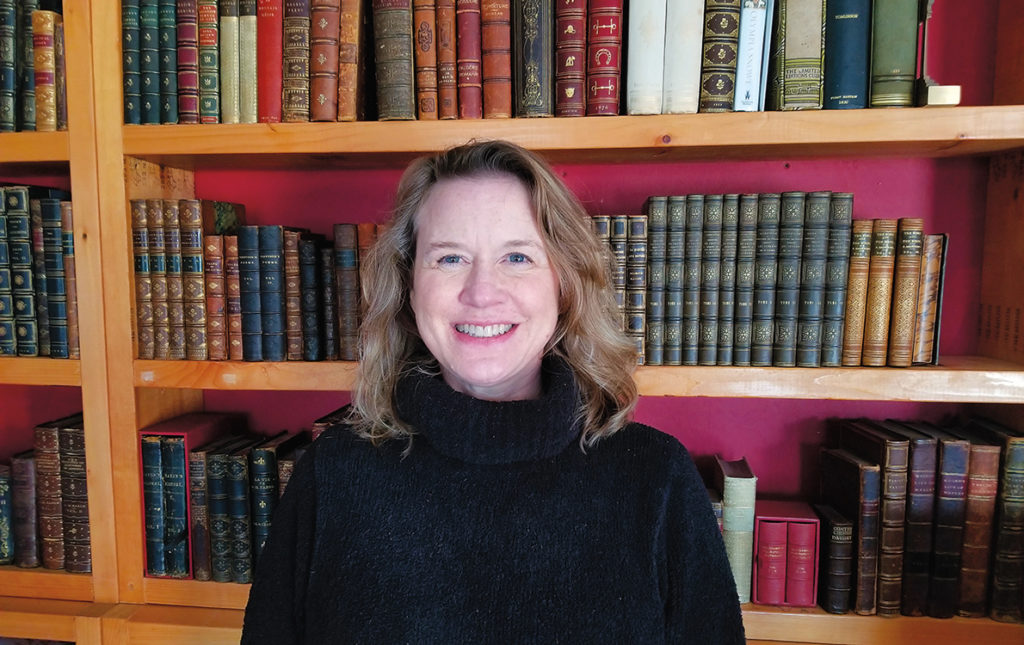By Tom Groening
Good luck to anyone trying to market Islesboro resident Melissa Olson’s The Rose by Another Name.
It features spies, murder, deception, conspiracy, and political intrigue, yet it’s not quite a thriller in the classic sense. It’s set in the 16thcentury, but it also isn’t quite a historical novel.
Eminently readable, it unfolds like a series of theatrical vignettes, but that doesn’t capture it, either.
Maybe it can best be described as a literary who-done-it. Or who didn’t do it.
Olson, who has been the librarian at the Islesboro Central School for the last six years, believes she has solved a mystery for the ages in Rose.
The book posits that Christopher Marlowe, not William Shakespeare, wrote the plays and poems that fill college curricula and library shelves.
Olson convincingly, and entertainingly, makes the case that Marlowe, an accomplished and successful playwright in the late 1500s, faked his death to escape a certain imprisonment and a likely execution, the result of his pre-Enlightenment heretical assertions about God, and his once favored, but declining status in the court of Elizabeth I.
Shakespeare, whose thin education and lowly social and economic status are documented from source material at key points in the book, acted as a “front” for Marlowe, she believes, much as movie and television writers who were “blacklisted” during the McCarthy era used friends and colleagues to sell their work.
For Olson, the writing endeavor was more than an intellectual exercise or hobbyist diversion. She earned a bachelor’s degree in history and a master’s degree in history and museum science.
“I really focused on the Tudor-Stuart era of English history,” she said. The book idea was born after seeing a television show.
“What really clicked, and the reason I started this,” Olson said, “was the PBS TV show Frontline,”and an episode called, “Much Ado About Something,” in which filmmaker Michael Rubbo investigated the question of Shakespeare’s authorship.
That led Olson to read several books about the Shakespeare/Marlowe mystery. Some of these were dry, academic tomes, and that’s not what she wanted her book to be, so she decided on the novel format.
“I wrote it so a non-scholar could read it,” she said. “What I wanted was for people to really think about it.”
By that measure, the book succeeds. The reader is introduced to young Marlowe, who, though his father was a cobbler, has aspirations to rise above his class. He is brilliant, mastering every intellectual discipline put before him. And he possesses a preternatural ability to read, and then manipulate people to his own ends.
Each short chapter opens with a quote from a 16thcentury document, underscoring the historical basis for Olson’s thesis.
“It took me 15 years,” she said of the research and writing process. “I drove the English teacher here crazy,” she said, with requests.
The source documents she quotes are many and varied, everything from the terms of the scholarship Marlowe landed to attend Cambridge and a letter from the queen’s privy council excusing his absences from class (he was spying on traitors in France plotting assassination), to his arrest warrant and the coroner’s report on his death—though Olson argues that it another man’s body.
Her research turned up a wealth of original material, she said.
“Everything is online,” she said, scans, translations, and collected documents preserved by museums and shared via the internet.
Olson expressed surprise at the suggestion that The Rose by Another Name reads like a young adult novel. It’s not that the work is juvenile; it’s that the short chapters, which feature dialogue-heavy character interaction that moves the plot along, are reminiscent of the Hardy Boys or the Harry Potter series.
And, in fact, Olson says she’s working on a screenplay version of Rose, which is easy to imagine producing a lively, colorful film.
One response to the assertion that Marlowe—or someone else, like Francis Bacon—wrote the plays, is that such a conclusion betrays an elitist bias, as if to assume an uneducated man like Shakespeare couldn’t be a literary genius.
Olson counters that “Marlowe was blue collar, too,” and certainly wasn’t from the privileged class.
The details she provides from Shakespeare’s life are few—because there are few. His parents signed church documents with an “x,” suggesting they were illiterate, and there is a seven-year period in which he left no paper trail.
If Marlowe escaped England and settled on the Continent, that fate explains the international settings of the later Shakespeare plays, Olson said.
“There was cutting edge science, world travel,” in the plays. “A person who didn’t have access couldn’t have written these plays. There are so many questions. There are too many irregularities. There are so many pieces to the puzzle,” she said.
Olson originally hails from Tuscon, Ariz., but has lived on Islesboro for 17 years. Her husband, Craig, works for the Island Institute, publisher of The Working Waterfront.
The Rose by Another Name: Christopher Marlowe, the Real William Shakespeare is available on Amazon and other online book sellers.





